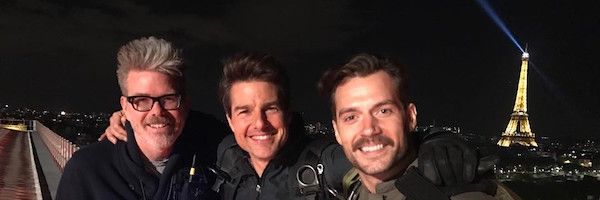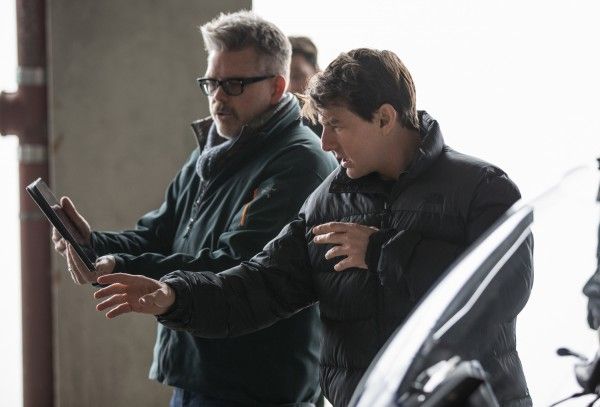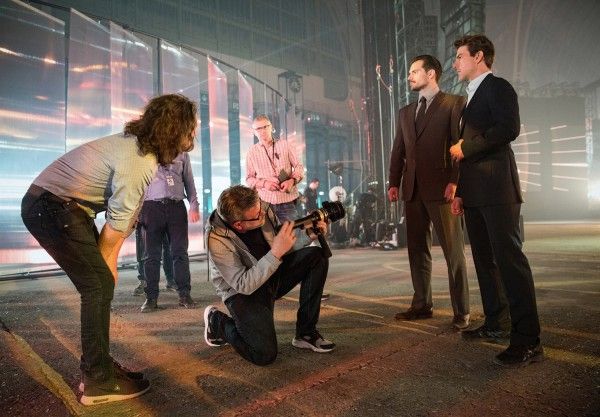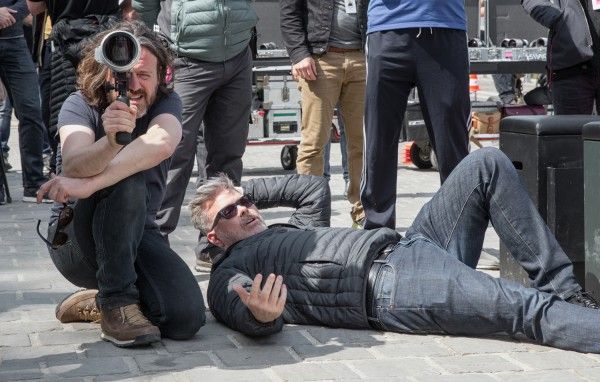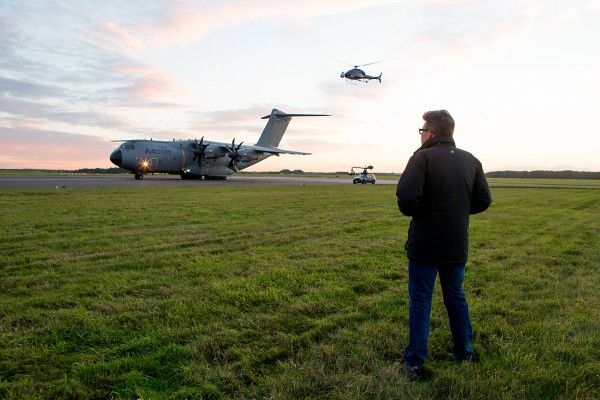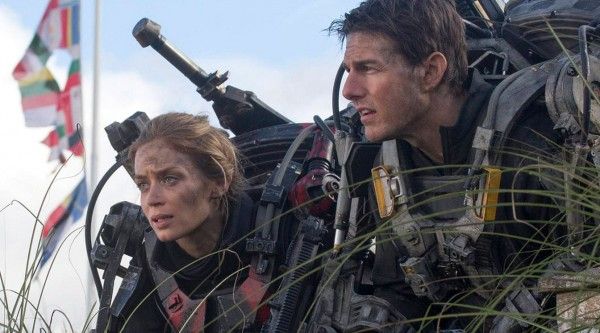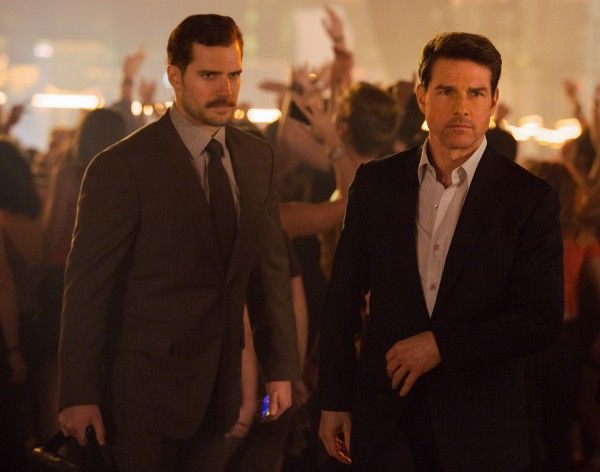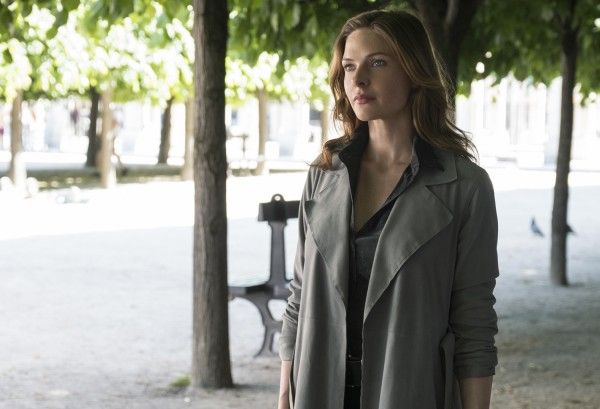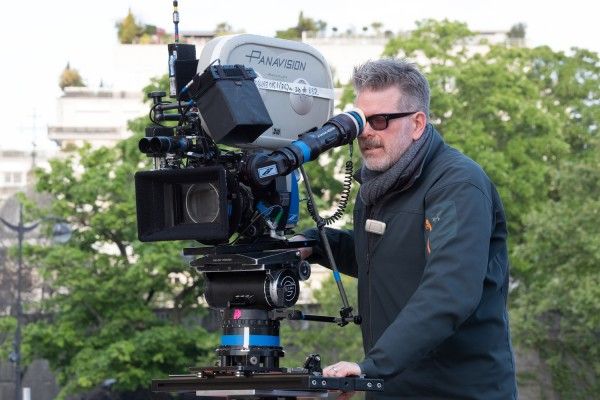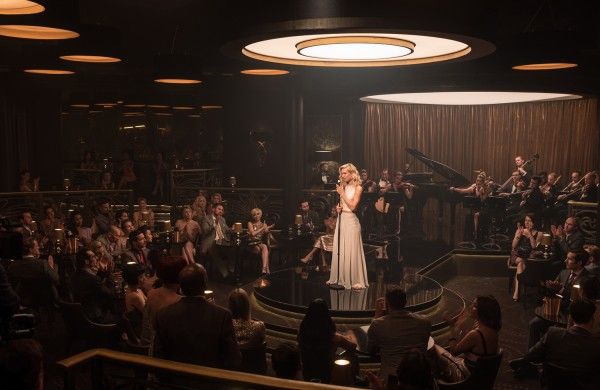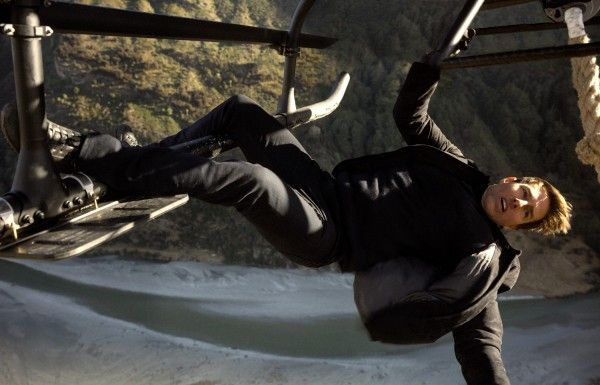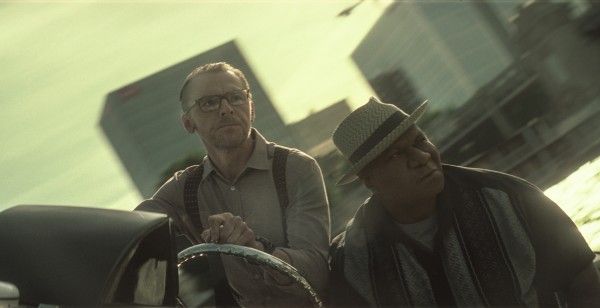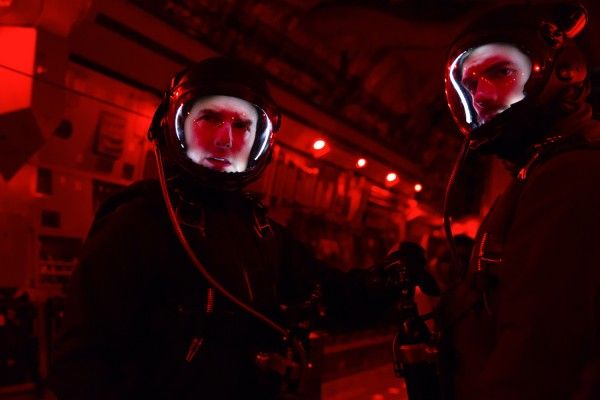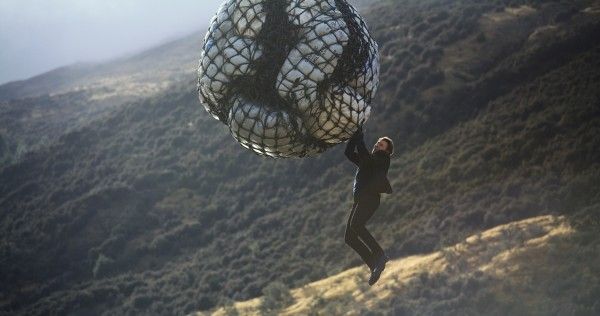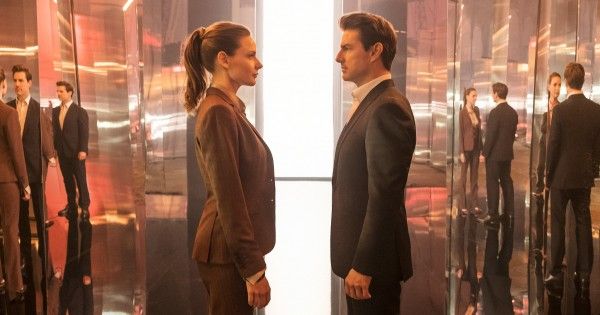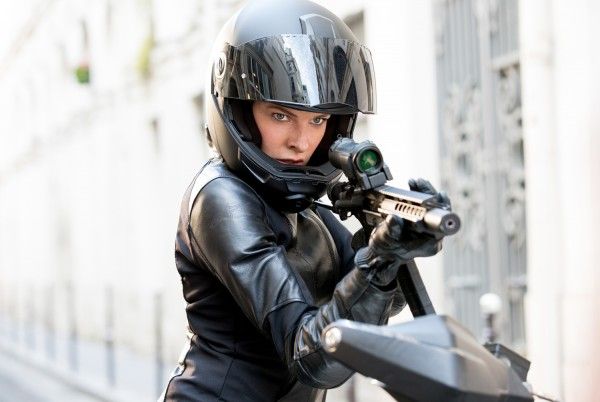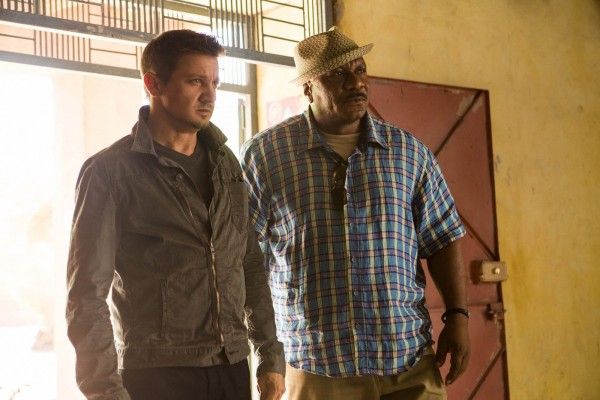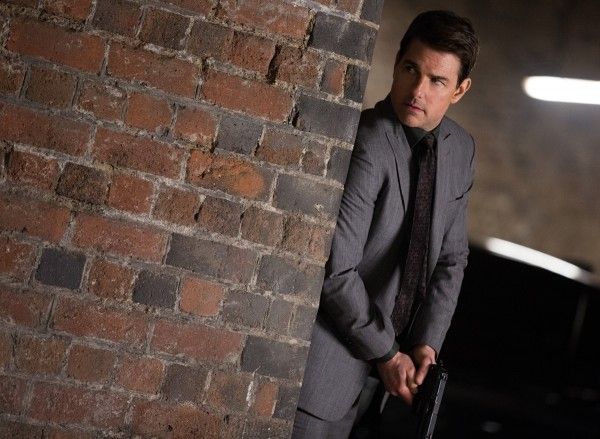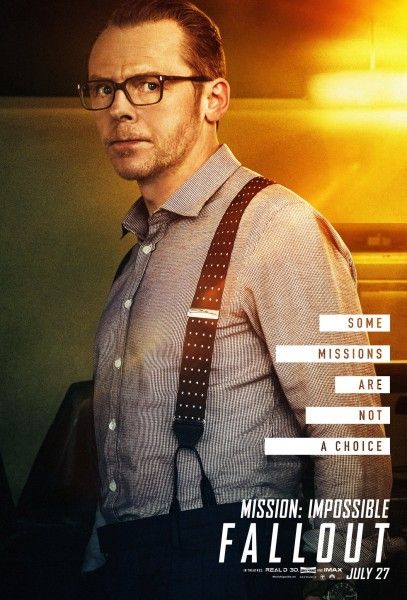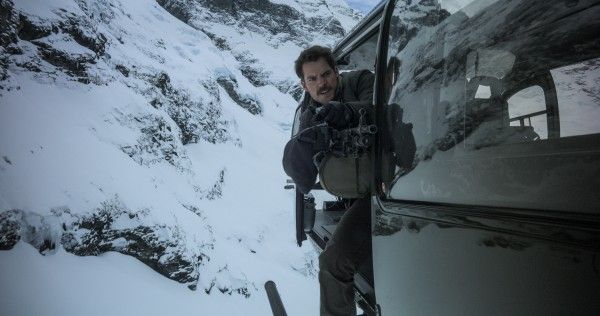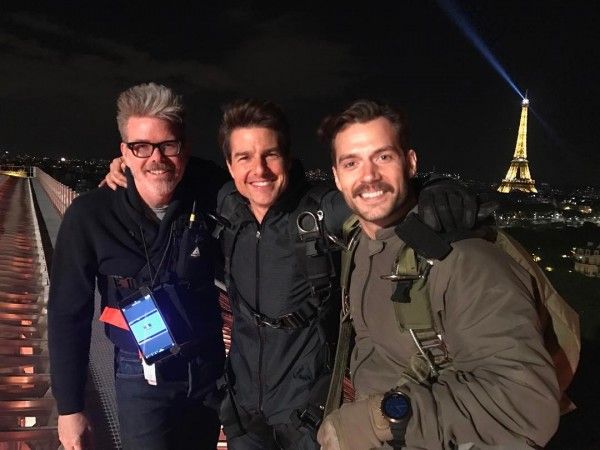While 2018 has seen some incredible movies, I’d argue one of the top films is writer-director Christopher McQuarrie’s Mission: Impossible – Fallout. Not only does the film feature some of the most incredible action set pieces I’ve ever seen, the movie shows off unbelievable work from every department, an incredible score by Lorne Balfe, and a script that keeps you on the edge of your seat until the final frame. It’s one of those rare films where everything just works.
As most of you know, Collider has a long-running screening series with IMAX and we recently screened Mission: Impossible – Fallout for some of our lucky readers. After the screening ended, I sat down with McQuarrie for an almost 90-minute conversation where we went in-depth on a myriad of subjects. Since the interview ended up being over 15,000 words, I decided to break it up into two parts.
In today’s installment, McQuarrie talks about whether he would helm a Man of Steel sequel with Henry Cavill, Green Lantern, the superhero genre, if he thinks an Edge of Tomorrow sequel ever gets made, why he didn’t include any music in the car chase, the challenges of filming the helicopter chase, and more. In addition, a number of the fans in attendance were able to ask questions that included his work on The Mummy, why Jeremy Renner wasn’t in Fallout, filming in IMAX, some of the scenes from the trailer that weren’t in the finished film, Lorne Balfe’s music, the chances of a Rebecca Ferguson spinoff movie, his thoughts on what’s happening on TV and streaming services, future projects, and literally so many other subjects it would be impossible to list them all here.
Check out what Christopher McQuarrie had to say below and here's part one if you missed it..
Mission: Impossible – Fallout stars Tom Cruise, Henry Cavill, Angela Bassett, Rebecca Ferguson, Michelle Monaghan, Ving Rhames, Vanessa Kirby, Sean Harris, Alec Baldwin, Wes Bentley, Liang Yang, and Frederick Schmidt.
What kind of movie would you like to do with Henry Cavill in the future, and can it be called Man of Steel 2? I can't be the only one to have asked this.
MCQUARRIE: You have not. Many, many people have asked, many, many, many times. I had an awesome conversation with Henry Cavill about an awesome version of Superman while we were on set. You're sitting around of hours, waiting for stuff to be built so I can put Henry in it, and throw him off a cliff, or freeze him to death. And we talked about a really awesome version of Superman, and it wouldn't— now, I'll address the other one, which is Green Lantern. Every couple of months it’s "Tom Cruise is in Green Lantern, which means McQuarrie must be directing," or "McQuarrie is directing Green Lantern, which means Tom Cruise must be in it." I had a conversation with the previous regime about Green Lantern. I'm not a comic book guy. I'm a story guy. So I don't care if it's Superman, or Green Lantern, or some superhero you've never heard of, to me it always comes down to, is there a good story? And can we make a good movie out of it? I don't really have that kind of... that comic book fan, thing. Which, I think, and I'll get myself into trouble, I think that's one of the things that's kind of crippling those movies, is everybody's got these moments in a comic book that they want to see put into a movie. That's not always necessarily the most cinematic thing, or the movie has to jump through hoops to get it. And I watched as other franchise movies try really hard to keep stuff that's canon, and strangles the movie to death, and I've been in meetings where I'm like, "Can we just move this?" "No, no, no, don't move that! Don't! Seven people saw that in a comic book ten years ago! It's established! It's canon!" And I was like, "But the movie sucks. Can we just do it?" "No you can't!"
That's kind of the world that it’s in, and when I came in on Green Lantern I was like, "Here's how I would do Green Lantern," and they were like, "Ah, but you know," and I said, "Well, that's what I would do," and they said, "Well, will you direct it?" And I said, "No, 'cause there's no script." And they said, "Well you write the script," and I said, "But I may not be the guy to direct," like don't make it a McQuarrie movie, make it the greatest Green Lantern you can make it. We don't know what that is tonally. We don't know what any of that stuff is until we get under the hood, and I may be the worst guy in the world. You may end up with Tim Burton's Green Lantern, and I don't have that pride of authorship. I'm not the guy who comes in and goes, "It's mine, from the visionary director." Bullshit fuckin' words. You're a director! You're a visionary, that's your job. [It’s like saying] From the postal delivery mailman. Sorry, I'm on a tear tonight. This is why I didn't want to film this…
I'm just gonna say, that as far as Superman. I just want to see Superman, but the heroic, optimistic, like a beacon of hope in this universe, that's the Superman movie I want.
MCQUARRIE: Yes. And is the movie Henry wants. There's a really, really beautiful version of that, and I honestly can't speak for the people who are responsible for making those decisions, except to say it's part of a giant corporate mechanism. I'm one guy. I can stand up and turn around, turn my back to you instantly, a giant corporation that's in the middle of a merger with another giant corporation, is an aircraft carrier in a broom closet being asked to turn around. Part of my job, and what's made my being a director so much more easy in this business, was ultimately coming to terms with the fact that the people that I'm sitting across from have much bigger problems than I do. They just do. And I sympathize with those problems, 'cause before I used to just view them as incredibly obtuse, and they don't know what movies are about. Of course they do. They all love movies. But this movie. This movie's a great example. This movie is simply an amalgam of limitations.
I start with a clean slate, I can do whatever I want. As soon as I decide that there's a helicopter chase at the end of the movie, it sets in motion a chain of events that creates a series of limitations that make the movie so impossible to figure out, because Tom Cruise has to fly a helicopter. Well, that's a problem, 'cause now Tom's got to learn how to fly a helicopter. And he can't just buy a helicopter and fly it, you need the support of Airbus, and Airbus says, "Tom's not flying a helicopter." And you have to convince Airbus that Tom can fly a helicopter. Then, you have to have a country in which to fly it, and every country on the planet goes, "Tom's not flying a helicopter. Not in our country. Go to the next country." And New Zealand says, "Sure, mate, c'mon, we'll let you fly. C'mon in, just go to the south island, where nobody lives, and that way you won't crash into anyone. Have fun."
Well now I gotta go, "Well, why are they in New Zealand? What's the villain doing in New Zealand? It's a really nice country that doesn't bother anybody, unless you fly helicopters there. What does New Zealand look like? It looks like Cashmere. Okay, so now, why is the end of the movie taking place in Cashmere?" And this, it's like you throw a pebble in the pond and it creates this giant ripple. And so I'm running a corporation that only costs, according to Box Office Mojo, 178 million dollars, which is a fraction of what a lot of these other movies cost, after you've reshot them, and split them into two, and made 55 of them.
Now, imagine you're a giant corporation, with this whole pipeline, and all of this IP, and everything else, you can't make decisions at the speed fans want you to make them, and now we're in a completely different era, where people are finally waking up to the fact that for literally hundreds of years we've been ignoring whole segments of the populous, and hiring white men to do my job. Right? And you've got to now open this universe up to all of these other people. They've gotta make so many decisions ... they're taking into account a whole giant audience, and the globe, and what do my problems matter? And Henry Cavill's problems matter? They've got to take care of everybody, and it's a really, really, really difficult set of decisions they have to make.
So I just sit quietly off to the side, and people say, "Hey, would you make Superman?" And I just keep responding, "Well, they know where to find me. They know where to call me," but I don't expect the phone to ring. I don't expect that to happen.
In closing the door on superhero stuff, it is the most popular genre on the planet right now, so I guess my question is for you, is it something that you're interested in?
MCQUARRIE: Like I said, I'm interested in story. I wasn't interested in Edge of Tomorrow, when Tom brought it to me. I said, "What is this?" And the script that I read was written by nine different writers, or writing teams. It was based on a manga from Japan, and the script was very bleak and very dark, and very confusing. Nobody had really worked out what the aliens were. Whether they were a technological race, or simply an animal race. Tom's character was essentially written like a guy in his twenties. And I was like, "Why do you want to do this?" And he says, "It's funny." And I was like, "No, its not." And he goes, "But it's gonna be funny. Trust me, it's gonna be really funny," and as he started to express to me his vision for the movie, Tom thinks in feelings, he doesn't think in terms of ... he's like, "I want the audience to feel this. I want this to be this way." I started to go, "Okay, I know how to get there, I know how to get to that thing." And then I wrote Edge of Tomorrow. I never would've volunteered for that job. I never would've read the manga and went, "Oh! I've got this idea."
What I want to do is Valkyrie. That was really what I'm drawn to. I'm drawn to World War II, and history, Alexander the Great, World War I, you know, I like these big sort of epic films, but nobody wants to make those movies. I would starve to death. So, I just go through the door that opens, and when somebody says, "You want to write The Tourist?" I was like, "Yeah, okay, I think there's a story there and we can figure it out." I don't always do that, but to me it's like, a comic book is no different than a gothic romance is no different than science fiction, fantasy, drama, it's all the same stuff to me. It's like, that's the opening through which I can escape into what I like to do, which is make shit up.
Sure.
MCQUARRIE: You winced when I said white men, by the way
I didn't mean to-
MCQUARRIE: Well, but I hope you understood what I meant.
Completely.
MCQUARRIE: It's me being ... I think what's happening is great.
Absolutely. Diversity matters.
MCQUARRIE: It's incredibly important.
A hundred percent.
MCQUARRIE: It's incredibly important and by virtue of the fact that there are four women in this movie, for example, as opposed to one in the last movie, and one in every movie before that. And that is a progression from Emily Blunt in Edge of Tomorrow, to Rebecca Ferguson in Rogue, to the four, actually five women, I count Alix Benezech, who plays the cop in that scene. All we cared about was that every women owned every scene that she was in, and when you open yourself up to that, you suddenly open yourself up to different dramatic dynamics. We just simply said women can't begin in peril that's not true. Women can be in peril. Ilsa is in peril, but I was really afraid to put Ilsa in peril in this movie, because I thought, now I'm gonna hear, "Ilsa was really great, then you put her in peril. You made her a damsel in distress." Well, yeah, but she gets herself out. And Benji's in distress, and other people ... Tom's in distress in the last movie. So we created for ourself simple rules by which it's a how do you give these characters agency in a movie in which they're not the protagonist? That sort of became the thing, and what happens then, when you open yourself up to that, is it feels at first like you're creating a limitation for yourself, but it actually becomes quite liberating. I think you're gonna see that happen in the movie business. I think you're gonna see that as they're opening that up, and I think it's great. I didn't mean to be incendiary when I said that comment. You winced like I pulled a tooth out. I'm gonna hear about this tomorrow.
I love Edge of Tomorrow, I'm assuming most people in here have seen it. And I know Tom and everyone has talked about doing a sequel, it's kind of a prequel, the way it's been explained. Do you think that ever gets made?
MCQUARRIE: There's an aircraft carrier in a closet. It's in that universe. It's in that sort of, where does it fit in their big giant machine? And we're there, we're ready, and by ready I mean, we have a title, and Tom would want to make a movie, which is really all we need to make a movie. They give us a start date, we'd be like, "Go everybody! Build suits and get Emily Blunt!" Tom's availability, Emily's availability, Doug Liman's availability, my availability, before you ever get on the deck of the aircraft carrier, those are the things, and it'll just come down to the will to make it, and a series of other miracles. The thing I've learned, you just kind of remain open. And the business right now ... the business, it's kind of like the movie business has thrown its back out. It's just a little bit locked up, and it's kind of moving very delicately, that's what's happened. And it's the result of, like I said, huge tectonic changes from within and without. 'Cause there's streaming media, there's all of these questions of diversity and how to address that, 'cause where's their pipeline? They didn't have one for people to be put in those positions, and now they're racing to build, it's like, well if you'd started a hundred years ago, you'd be in much better shape than you are right now.
I love the music in this movie. It's such a character, but there's a key car chase in the middle that has no music.
MCQUARRIE: Yes.
Why did you do that?
MCQUARRIE: Car chases involving two or more cars should not have music. That's kind of my fight. If you have two engines, you don't need a score. You've got one ... it's just ... engines are so harmonic, and cutting back and forth between them. Cutting in the vehicle, out of the vehicle, right there, if I have two cars, I have inside the car, outside the car, that's two sounds it's making, two different harmonies, now I've got two cars, I've got four. You only need three chords to write a hit song. So, that to me, it's all about the sound mix.
If you listen, this movie, by the way, has one of the best sound mixes I've ever heard in my entire life. James Mather and his team were truly amazing. If you listen to the car chase, you listen to the BMW as it degrades over time. It starts as a finely tuned machine, and by the time Ethan gets to the end of it it's beat to shit, and belts are squeaking, and things are rattling, and the whole car is kind of like, the car's doomed. That's the stuff that I enjoy. But also, in this instance, that whole sequence is a reel of the movie. You're talking about 20 minutes of vehicles, and music, and we kept getting notes that it was really long. And we kept cutting it further and further and further, and no matter how far we cut it down, we kept getting notes about length. And I suddenly realized it's not the length of the sequence, it's the sound design. It's so punishing. The music, and the sound design are both standing on a table, shouting at the top of their lungs before Ethan ever even hits the truck. That you're exhausted by the time the chase kicks off. So we went in and reshaped the sound design, and it's truly some of the best detail work in the entire movie, is when to go to six, when to go to 11. When does music win out over sound design, and vice versa? And by the time we get to the chase it's like now we just pull everything back, and just let it be about the engines.
The helicopter sequence at the end. If I'm not mistaken, everyone was frozen solid, or very very close.
MCQUARRIE: Henry Cavill was frozen solid. He's in an open helicopter, sometimes at 7,000 feet, dead of winter, New Zealand, hundred miles an hour. I tested the open doors of the helicopter,in the summer in New Zealand. It was late summer, turning into fall. I got into the helicopter wearing what I'm wearing now, and a down vest, and said, "Take me up to 7,500 feet," and we got up to 72, and I said, "Take me back immediately!" And it was cold. It was very, very cold. It was unpleasant. And when Henry was up there it was just bitter. He really is the unsung hero of that sequence. You know, when they say everything Fred Astaire did, Ginger Rogers did backwards and in high heels, everything Tom Cruise is doing, Henry is doing backwards with the doors open in sub zero temperatures. Freezing his eyeballs.
Was there ever a point where he actually said, mercy, let's go down?
MCQUARRIE: No.
That's crazy.
MCQUARRIE: Yeah. Henry is the man. He's really ... and moreso, he would come to work every day and find out that whatever his character was the day before was not that character anymore. "Ah, we rethought that, it didn’t work, it’s a whole other thing," and Henry would say, "Well, can I do this? Yeah? Can I do that? Yeah? Okay." And then he would just go off to work, and he'd never complain. He understood from the beginning, Mission has a mind of its own, it's gonna go where it wants to go, just go with it and you'll be delivered. And you see remnants of our figuring out his character early on in the story, and he really was great. He's really extraordinary.
You have some incredible action set pieces in this movie. Which sequence was the one you thought, "We're never gonna pull this off?"
MCQUARRIE: Every one. Tom actually called me when we were in post, he called me in the middle of the night, he was like, "I'm really disappointed." And I said, "Really?" He goes, "Yeah. That heli sequence could've been better. The helicopter sequence could've been so much better. I feel like we let everybody down."And I said, "No, Tom, the music's not there, and we haven't done the visual effects yet, the sound design," and the whole time kind of thinking to myself, "He's right. This really sucks. I don't think I can keep this conversation going much longer." And we really, we just feel like it needs to be so much more, and Mission constantly teaches us, you're okay, if they care about the characters, you're gonna be alright. I never thought the third act of this movie would be anything more than passable. I thought we were gonna get ... "Eh, it kinda runs out of steam right around the time they get to Cashmere, but they tried hard." I really thought we were gonna get that. I never thought people would be as invested in the third act of the movie as they were, and that's about the characters, and the actors. It's a great cast. It's an unbelievable cast for this movie.
So, real quick, what I'd love to do is lightning round. Which is try to get through a ton of questions really fast, and that way everyone can kind of participate a little bit.
[Audience questions start]
Were there any notes you gave the people that made The Mummy that they didn't take?
MCQUARRIE: On The Mummy? None that would have made a difference, you know? I would say. I've been working with Tom for 12 years. This was our ninth movie in a 10 year period, and some work and some don't. We tried hard. And The Mummy was one of those that it came to me like Edge of Tomorrow, and I was like, "The Mummy? What's The Mummy?" But I, you know, Edge of Tomorrow worked, I was like, "Great, we're doing The Mummy," and we're like, "Well, we tried The Mummy." Movies are chemistry. They're all chemistry, they're all very very very delicate recipes, and sometimes the recipes work, and sometimes they don't. We worked really really hard, and Alex worked really really hard. I felt really terrible for Alex after that movie, 'cause he got sort of pilloried, he got beat pretty hard. It's one of those things it's like Vietnam. You can't know, you weren't there. And the people who watched the movie, they just say, "Oh, they could've done this, and they could've done that." It's like, we tried everything. That's what happened. So, I take full responsibility, how about that?
Okay, so for the infamous instant pocket, instant beard bathroom shot, why did two shots have to be merged together, why couldn't you just use one shot, or the other shot? That was the thing that always confused me.
MCQUARRIE: It's one shot. I promise. Total trick of the light.
Seriously?
MCQUARRIE: I swear. First of all, if those were two shots merged together, it would be the greatest visual effects ever, that we got Henry standing in the exact same place doing the exact same thing. Total trick of the light. It appeared on the internet, and I've had a lot of fun not answering it, I took a video of the screen, like in close up ... I promise you there's just ... it's the detail of film versus digital. If I shot that on AK digital, you'd see the pocket was there, and all that. We didn't have time. There was no time to go back and make that setup again. Every setup you saw in there, you got one, two takes and you were outta there. Promise you it's a trick of the light. It's awesome. I'm glad people are talking about it.
So you talk about the fun that you had working with Jeremy Renner in Rogue Nation. Assuming scheduling and budget is clear, could you see bringing him back into the fold?
MCQUARRIE: That is up to whoever makes the next Mission: Impossible. I would've brought him back for this one. He was unavailable.
I grew up watching a lot of movies at Island Video in Seattle, which I know is your-
MCQUARRIE: Oh yes, of course.
And those video stores are gone now. Is that something that you, as a filmmaker really miss in the world, being able to walk into a store?
MCQUARRIE: I do. I used to go into Island Video all the time, and talk to the guy working. You'd go in not knowing what you were going to see, and this dude would recommend something, that's something you don't get anymore. You get the front menu of what they want you to watch.
Will the aspect ratio change in the Blu-ray for the IMAX scenes?
MCQUARRIE: Aspect ratio will change on the Blu-ray. At our insistence it will. There's all that good film that would never be seen.
Before we get into the next question, you shot a lot of this stuff in IMAX, it looks effing incredible. Was there ever any talk about shooting the whole movie in IMAX?
MCQUARRIE: No, God no. All the IMAX that we shot in this film is not IMAX cameras, but it's digital cameras, which can shoot in an IMAX ratio, and at an IMAX resolution. The cameras needed to be very small, obviously one was mounted to a guy's head. The other ones were on helicopters, so everything was done for weight. IMAX cameras are very specific and very particular. I think this movie, with some of the intimate scenes and everything would've been trick.
In the trailer, there's a shot where you think Tom Cruise in the helicopter is gonna hit a truck. How did he get out of that situation?
MCQUARRIE: He pulled up[laughter]. The whole gag was he was too busy looking at cars and walked by, and he looked and saw the truck, and he pulled up. And it took you so far out of the story, needle was dipping, we cut it out. All the notes about length of the sequence went away.
How many takes did it take Wolf Blitzer to get that scene?
MCQUARRIE: No more than anybody else.
Really?
MCQUARRIE: Yeah, no, Wolf was great, he was really awesome. He read the speech like two times, and came in, did a couple of shots around the bed. Wolf was awesome. He did really great, it was a lot of fun.
You talked a little bit about how you hate temp music, the score for this really really works, so at what point did you decide to involve Lorne Balfe, and how early was that music written?
MCQUARRIE: Good question. Lorne Balfe was involved before we started shooting the movie, and was already writing music before he'd seen anything shot. He was writing a lot of stuff that was both original music and stuff based on the theme, and there was this one little piece that he threw in as kind of an extra, which was the music, the very first cue you hear in the movie, over the wedding, and it's also over the shootout, at the end, the last shootout. It was this piece he called "Love's Reduced," and I think on the soundtrack it's called "We Are Never Free," and that really became the backbone of the score. And the reason why I don't like temp music is I've just seen, many many times, directors fall in love with the temp music, and then they're asking very talented people to copy somebody else's music, but also, temp music gives you a fake sense that a scene is working, and when you take the music out, suddenly watch the scene cold, you realize, "This scene doesn't work at all." So I cut the entire movie, from beginning to end, and will not listen to a shred of music with that movie, unless it's original, until the film has been assembled.
In all the other Missions, I know there's always that big stunt, and it's like, "I gotta get into this building, but I can't, so I have to scale it," what I loved about this was everything happens in the heat of the moment. Was that intentional?
MCQUARRIE: Absolutely. Yes. We went in kind of like, "Oh, you've gotta come up with a stunt." The stunt in Rogue Nation, which was the airplane at the beginning of the movie, everybody wanted that to be part of the climax of the film, and I said, "You're gonna put it in the trailer, everybody's gonna see it 500 times, let's just get it out of the way." With this, the first stunt was really Tom grabbing onto the helicopter, and then we kind of realized that it was not a stunt, it was more a sequence, the helicopter, the HALO, and that the stunts themselves really took a backseat to that, which I would highly recommend to the next guy that carry on, just takes all the pressure off of a stunt.
I love Ilsa's character so much. Is there a possibility of a spin off, standalone, Ilsa Faust movie?
MCQUARRIE: That is a darn good question, and Rebecca and I have talked about it, Jake Myers and I have talked about it, Tom and I have talked about it, it's this...the spinoff, when we talked about it was like, what would the movie be? We've talked about many Mission spinoffs, it's not just about Ilsa. Mission is so much about the exploits of this character. What would the spinoffs then be shaped like? Would they still be Mission: Impossible movies? So much of what defines Mission is the fact that Tom Cruise is doing all of these crazy things. And so Rebecca and I were talking about it, and I said, "I've got a better idea. You're Rebecca, like let's give you your identity," and I'm developing stuff with Rebecca to be Rebecca. And that's what I would like to see. I feel like if you make an Ilsa spinoff, it would always be like, "When's Ethan gonna make his cameo?"And the thing that's not to be underestimated about the role of Ilsa Faust, is that she is played by Rebecca Ferguson, who is a star. And it is a star that a lot of people haven't figured out, haven't woken up to that fact. And I'm kind of at her service. We have such a good working relationship, she's very trusting, there were many, many times where I'm like, "I can't really explain to you what's happening, 'cause I don't know what's happening in the next scene, but I need you do to this emotion right now," and she's like, "Yeah, okay, I'll do it, I don't really know what you're talking about, but I know what you need."
And so I would love nothing more than to see all of that talent put into a role that was not bound to this universe. I feel like Ilsa is part of a team. It's like, what would a Benji movie be? What's Benji without the rest of the team? And truly, what's Ethan without the rest of the team? He's always gonna need that around him. So, yeah, I would love to see— I have the thing, it's that thing. It's the other one that I can't get made, it's for her. And I'm like, "Just do it, it's so good." It's so good. I didn't write the script. It's so good. [I was] crying at the end.
The inclusion of Julia in this movie, the character of Julia, raises the stakes so wildly, was that something that you'd always planned to do, or was that something that got put in the rewrites?
MCQUARRIE: Day one. First thing I said to Tom, "What do you want to do? If you can do one thing in this movie?" And he said, "People are still asking me about Julia, and I want to give that story closure." And I said, "We can do it, but it can't be a detour in the movie." Like, you know, after the opening of the movie he goes to see Julia, and they have like a ... that'll just get cut out of the film, I've made a Mission already, and knew what survived. Every scene in a Mission movie has to fight for its right to be there. So I said, we gotta bake it in, and as such, here's how the movie opens, and here's how the movie closes, and the end, there must then be a scene somewhere in the movie where Luther tells the story to Ilsa, because you've got to reintroduce the idea of Julia. So Julia's story was the very first conversation we had, and it was the backbone of the movie.
What a gifted storyteller you are, is something like a True Detective, ten episodes, in your future? I can't believe that Netflix or Hulu wouldn't trip over themselves.
MCQUARRIE: So many you can't believe it. I'm currently developing a lot of stuff for television. My wife and I work together in television, and we have gone dormant in TV for a long time. I'm developing a load of stuff for television, including something quite massive. Whether those things happen, or when they happen, with everything else that's going on, I don't know, but yes. PG-13 is choking movies to death. It’s not critical of the MPAA, they gotta do what they gotta do, and I understand why they exist, but people are wondering why are kids migrating away from movies and saying, "Well, they have short attention spans," not if they're watching 13 hours in an afternoon. That's not a short attention span. They're home watching content that they can't get. I can't show people smoking, I can't show blood, I can't say fuck more than once, and there I just did it. And if I say fuck again, it's now an R rated podcast. That medium, when I watched the first season of Fargo, and got to the last episode, and there's a guy setting a broken bone that was shattered in a bear trap, and I turned to my wife, and I was like, "I can't do any of this. This is what I want to do." It's not that I want to do bear traps and all that other stuff, that's not what it is, it's just the freedom that it gives you, not only in a ten-hour narrative, but just in terms of content, so short answer, sorry, yes.
Is that your voice, when the job is offered?
MCQUARRIE: Yes, that is correct. That is my voice. Couldn't find anybody last minute.
You had really ambitious stunts, did you plan ahead extra time to make sure that could happen?
MCQUARRIE: Whenever we could, but not always.
You have this clear priority on story, is there anything you credit, early on, 'cause it's evident in even your early films you wrote, that this is how I learned this kind of craft?
MCQUARRIE: People tell me that even as a little kid I was always telling, and I'm sure you'll be surprised to hear this, very long stories. I was just a storyteller. It's just a thing that came, I think from my dad.
Tom Cruise is really famous for his running, did that have anything to do with naming his adversary in the film Walker?
MCQUARRIE: Darn good question, no.
During the convoy sequence, the forced diversion reminded me of The Dark Knight, was that an influence?
MCQUARRIE: No. And I get the question a lot, about The Dark Knight, I think because of Lorne Balfe's music, but also, because of shots like that in particular. No, that was literally the only place in Paris, where you could knock the truck in the river. And we went all over Paris, we were looking everywhere, and I must be honest, I've only seen The Dark Knight once, and had no memory of it, and then right after the movie came out, somebody showed me that, and I went, "Oh, fuck." But I will say, I really deeply admire Chris Nolan, and I'm utterly gunning for him, that's a guy I look at and say that's the gold standard. I'm not trying to take from Chris. There are things in this movie, by the way, people are like, "Was that taken? And was that taken?" I was like, "Apparently I've stolen from every movie in my subconscious," but no, there are not a lot of homages or anything, in the movie, or direct lifts, but Nolan did it first, and he did it better.
It's not about Mission: Impossible, but in The Way of the Gun, did Sarah Silverman improv some of her lines in the beginning scene?
MCQUARRIE: Yes, she did. I would feed her offensive terms, and we would all talk about, what's the most offensive thing you could say? And then she would go off. And Henry Griffin, the red headed guy, her boyfriend in the movie, he improvised all of his dialogue as well.
Are you ever gonna make the John Ford biopic? Who would you cast as John Ford?
MCQUARRIE: Well it depends on what age, but John Lithgow with an eye patch would look a lot like John Ford.
You've been a pretty vocal admirer of Sidney Lumet. What in particular of his direction are you influenced by?
MCQUARRIE: He's not in his movies. He's not going, "Look, I'm Sidney Lumet, and I directed this movie, and isn't this a clever shot?" He tells a story, and he tells it very cleanly and very elegantly, and all of the directors that I love and admire are, one day I noticed what I like most about them was that.
First of all I just want to quickly say thank you for making all of the female characters in this movie badass in their own right, completely. And my question is, what did Ilsa say to Julia?
MCQUARRIE: Can’t tell you.
Dammit!
MCQUARRIE: Short enough for you?
I really love the character interactions in this movie, 'cause they're all full of genuine love and care and respect for one another. In a genre dominated by very sarcastic and mean and angry interaction with each other, was that a deliberate choice?
MCQUARRIE: Absolutely. Sarcasm is death, I'm allergic to it, I can't stand it, it's the cheapest, easiest. People hate puns, I hate sarcasm. To me, it's worse than the worse kind of exposition. Except when Ryan Reynolds does it in Deadpool. See, it works in that world. It's like, if you do it right it's great, but in a Mission: Impossible movie it'd just be lazy.
When you're prepping a Mission, do you go back and study previous Missions? Or do you just leave it at that?
MCQUARRIE: No, yeah, I wouldn't 'cause I think you would be influenced by it, and then I'd end up doing something stupid, like having Tom climb a mountain, like he did in the second movie. [Laughter]
Does Tom ever say, "We've already done that?”
MCQUARRIE: Yeah. Yeah, he will say that. Or, “does it concern you that?” And I'd say, "No, 'cause we're gonna do it like this," but yes, we kind of check ourselves a lot. But I can already think of one sequence he wants to do better.
Do you watch any movies to get you in the mindset of this film, and do you like to do that when you make movies?
MCQUARRIE: I did a lot. On Rogue, I watched North by Northwest a lot. I watched the Parallax View a lot, which is a film I really like. I deliberately did not do that on this one. I tried very hard to not do that. I probably should've watched The Dark Knight before I watched this movie, that might've been good.
Are there any outside movies, that you wouldn't think that would be an influence on this movie?
MCQUARRIE: Rob Hardy, big fan of Point Blank, John Boorman's Point Blank, and there are little winks that I did for Rob, to him, from Point Blank. There are other things that subconsciously look like Point Blank, but we weren’t intentional. And Klute, Gordon Willis. People ask me who's my favorite director, Gordon Willis, he's an amazing, amazing filmmaker in his own right, cinematographer, and he's had such a wide influence on what I do.
There's a motorcycle chase in Rogue Nation, and a sequence as well in Fallout, which one of those was your favorite to shoot, and which one did you find to be the most challenging?
MCQUARRIE: Ooh, which is more challenging? Each in their own way, I mean the one in Rogue Nation, the location was really challenging. This one was challenging, only because the time that we had in these locations. We shot, I thought it was 90 minutes, I went back to the script supervisor, who told me that everything at the Arc de Triomphe was shot in 51 minutes, and everything we shot at the Arc de Triomphe, and the Rue de Opera, that big long street, was shot in one day. 'Cause that's what we had those locations for. So that, I would say, was probably worse. And all of the safety rigs that we had designed for Tom failed, and I said, "What are we gonna do?" And Tom said, "We gotta shoot," and he got on his motorcycle and took off, and everything you see him doing is with no safety rigs, wet, cobblestones, fucking dangerous, like now it's really an R rated podcast. Really, really dangerous. The most dangerous thing Tom's ever done, next to the helicopter.
So, I see a lot of influence of the original series in your Mission movies, more so than the others. Am I making that up? Am I seeing that-
MCQUARRIE: I don't consciously do it, but Mission: Impossible, Star Trek, like those were comfort food for me, growing up. It was like, you came home, and after you did your homework it was a lazy afternoon, in that hour before dinner, I remember it was always Mission: Impossible and Star Trek, so I think I've absorbed a lot of it, and that's probably what you're feeling. I have great, great affection for that, and especially Lalo Schifrin's score, which, a lot of the other movies have not accessed as overtly as I have. I'm always like, "More."
Have you worked on any Star Trek stuff?
MCQUARRIE: I haven't. It's another one I would like to do.
I heard there's someone from Paramount over there. Pass that up the food chain.
MCQUARRIE: Star Trek, awesome. Wrath of Kahn is, ah! Science fiction, Wrath of Kahn. Right next to The Thing, Star Trek II: The Wrath of Kahn is effing awesome.
Have you ever written for a city, and they said no?
MCQUARRIE: No, no, 'cause we always— like in the case of Rogue Nation, we went to Morocco 'cause Morocco had the highway, and they said, "you can come." We always go and scout. In the case of this, I went an scouted the whole movie before I wrote the screenplay. I had an outline, but I was very determined to go to Paris.
Is there any other older television shows, or film properties that you would like to see rebooted or made? Or something you’d like to take a stab at?
MCQUARRIE: It's that movie [I mentioned earlier]. It's a remake, and it's so good. It's a remake. And I'm like one who's like, "Don't remake movies, unless," and it's a very good movie, but a deeply flawed one, and you could just make a little change and put Rebecca Ferguson in and it'd be awesome.
Which was one was more satisfying to write, Rogue Nation or Fallout?
MCQUARRIE: Oh, I would say ... what I'll say is everything involving Alec Baldwin is the satisfying stuff to write. It's not one movie or the other. Like Alec Baldwin, writing the manifestation of destiny speech for Alec in the last movie, and writing the London sequence for Alec here. And by the way, everything that happens to Alec in this movie, was Alec's idea. Alec said, I'll come back, but this is what I want to have happen to the character, and I was like, if you're down for that, I'm game. What actor would volunteer for that? Basically writing themself out of the franchise. So, yeah, Alec.
If you did have an opportunity to do Star Trek, would you rather pursue it in television, or for streaming or something like that, or as a theater film?
MCQUARRIE: Yeah, probably a feature. Probably, yeah, a feature. I feel like Star Trek is kind of… it's gone away from what the tenants of the series were about, which was kind of the hope and the promise and the science.
But don't you think that when you make the feature, you have to hit the four quadrants, you gotta make it sort of an action-y, swashbuckling thing, and when it's on television you can do more sci-fi?
MCQUARRIE: It's simple math, you know what you have to do with Star Trek? You have to make Star Trek for a domestic audience. Star Trek does better domestically than it does internationally, so I would come to Star Trek, and go, "Realistically, how much money should I make this Star Trek movie for?" And you'd give me a budget, and I'd go off and make the movie. That's what I would do. You look at any movie like that, if you just be honest with yourself about the economics, it's just a very real part of doing that.
Have you talked to Simon Pegg about Star Trek?
MCQUARRIE: Only after the fact. Like, we haven't talked about doing one. I mean, I told him, I was like, "I'd love to do a Star Trek movie."
One of my favorite things about all of your films, have great clarity in action sequences. What advice would you give people to follow?
MCQUARRIE: Clarity and geography. You’ll notice when they walk into the bathroom, how much effort we make to establish that it is a three dimensional space, with a divider down the middle. When you take one of those shots out, you become so geographically confused, it looks like characters are disappearing. So, yes, I would just always say ... and most importantly, when you're writing, write what you want to see in the order you want to see it. A lot of writers writing action kind of don't do that, they sort of say, "Oh, somebody else will figure it out." Just tell your story visually, and simply, but most importantly, understanding the three dimensional space.
I'm gonna end this with one last question, which is when you're writing your screenplay, and you're designing action like this, how much, like for the bathroom fight. How much in the screenplay are you illustrating on the page exactly how the sequence is gonna be played out, and how much are you sort of giving a rough outline, and then turning it over to stunt people to figure out how are we gonna play this
MCQUARRIE: It depends. On fight scenes, it's kind of like, I want these major things to happen, and then you let the guys play, and we all shape it. Other things like the motorcycle chase, I went and worked it out. I secured all those locations and then figured ... for example, Ethan going through the light well, that came from a scout, because they took me on a tour of the river and I saw these things and I went, "I know where the sequence gotta end, if it's gotta go here," so, sometimes I let location determine action, and other times I let stunts determine action, and sometimes it's story, there's an absolute point that you want to make, so it's kind of a combination of all those.
How awesome is the bathroom fight scene? I mean seriously.
MCQUARRIE: Another one that really mystifies me, I gotta say, right up there with Henry Cavill milking the invisible cow. I looked at it and I was like, "Yeah, it's bathroom fight," and people have responded to it. Test audiences, it was their favorite scene, and I was so stunned by it, it just goes to show you, you have no objectivity, you don't know. We were originally scheduled for four days, which was very ambitious, and we actually shot it over, throughout our entire time in London. We kept going back to the bathroom to shoot little pieces, because the fight itself, the bulk of the fight itself took maybe three days, but then all the little pieces in the stall, and the four French guys coming in, and the three French guys walking in, and all that. Ilsa's entrance, all of that. Trillions of pieces took a really long time, and the last shot of principal photography was Liang Yang pointing the gun at the camera. So the first shot of onstage, when we got back from Paris and New Zealand, and the last shot of principal photography were in the bathroom. The bathroom was like The Opera House, we just kept going back, we need a piece like this, it was painful.

